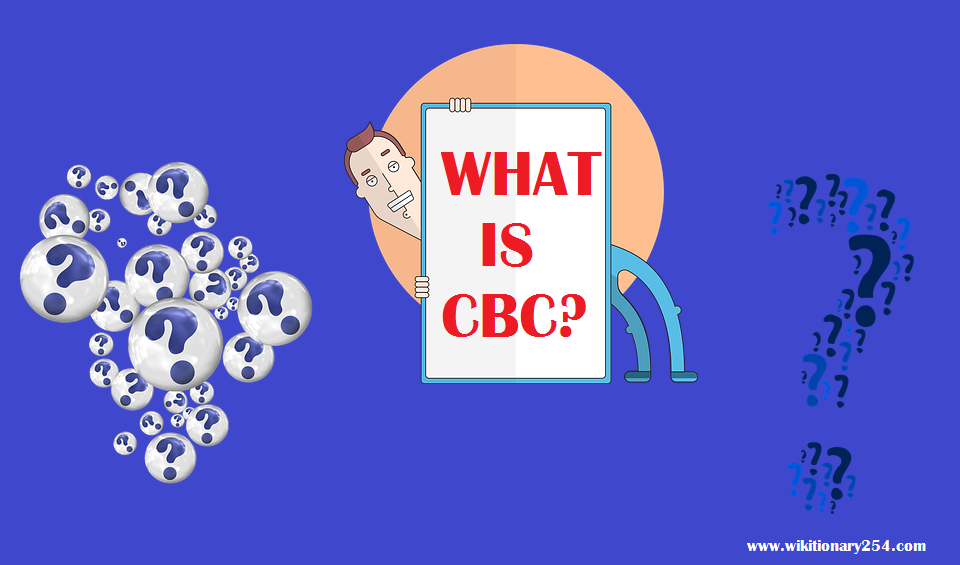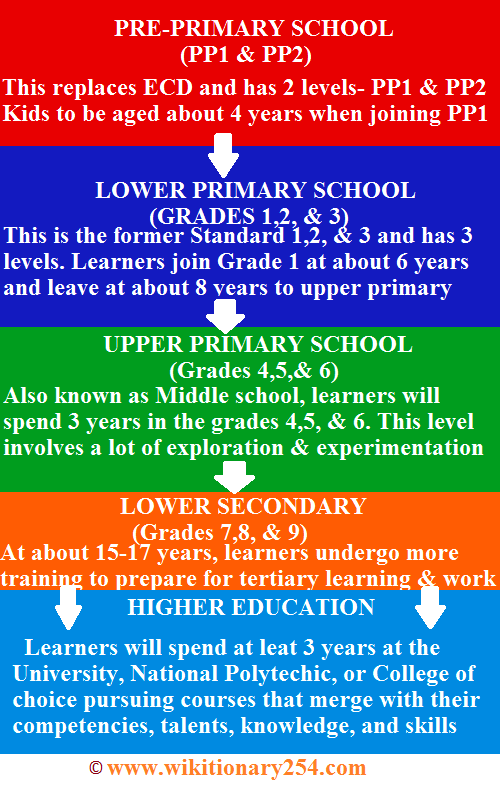Last updated on March 13, 2021
So, what is competency based curriculum?
Competency based curriculum (CBC) is an education system that puts emphasis on a learner’s unique talents and abilities rather than focusing wholly on academics and exam performances.
The key aim of CBC is to help identify learners’ special capabilities then nurturing them through relevant teachings so that learners benefit from their talents.
In short, CBC is immensely different from other education systems including 8-4-4 and its precursor, 7-4-2-3 since the latter two are examination oriented and assumes that all pupils must pass exams to succeed in life.
Essentially, CBC recognizes that each child is gifted differently and seeks to promote every kid’s genius in the hope that children can eventually profit from their God-given talents.
Let’s now turn to other CBC questions now that you know what is competency based curriculum.
Up first is the CBC curriculum design..
Competency based curriculum design
The Competency based curriculum (CBC) curriculum is tailored to help learners achieve complex outcomes of the learning process – knowledge, skills, and attitudes- necessary to build a career in their area of specialization.
In principle, the curriculum is extremely learner-centric and adapted to suit the specific needs of students depending on their inborn talents.
In Kenya, the competency based curriculum starts at the pre-primary level when children are aged about 4 years and ends at grade 12 when he/she is about 18 years old.
Throughout, pupils are exposed to learning activities in environments intentionally selected to help them acquire and apply certain know-hows, skills, as well as attitudes to practical situations.
Learners specialize and take different career pathways from Grade 9.
In short, the syllabus moves concentrates less on theoretical teaching and more on imparting competencies that mirror what happens in everyday life.
These key competencies can be subject-bound and/or cross-curricular and include the teaching of in- demand soft skills and appropriate values.
Competency Based Curriculum Structure
In total, learners will spend 5 years in early education as follows:
- 2 years in pre-primary
- 3 years in lower primary school.
They will then proceed to middle school where they will spend 6 years as follows:
- 3 years in upper primary school.
- 3 years in lower secondary school.
Senior school and college education will each take 3 years.
Some call the CBC system the 2-6-6-3 to mean 2 years (pre-primary), 6 years (middle school), 6 years (in lower secondary and senior school) and the 3 years (minimum) of college education.
Features of Competency Based Curriculum in Kenya
Here now are the standout features of CBC..
- CBC is outcome-based: The first step in competency-based learning is to defined precise learning outcomes. All lessons are hence geared towards the achievement of the set skills/competencies.
- Learner-Centered: First and foremost, CBC learning values the student as an individual. For this reason, CBC empowers learners to master valuable skills / knowledge at own pace.
- Differentiated: CBC learning practices are adjusted to meet the individual needs of specific learners. All the interventions are determined by the learning requirements of the student.
What is competency based curriculum (CBC) key differentiation?
I have just mentioned that CBC is vastly differentiated from conventional education curriculum.
But how big is this difference?
Take a look:
First, learners develop understanding through an inquiry-based learning approach (instead of traditional methodologies such as lecturing).
Then, CBC fosters the development of crucial soft-skills such as critical thinking, creativity and imagination, and problem-solving in learners.
Towards this end, learners perform countless investigative, explorative, and experimenting activities in the course of learning.
Such soft skills give learners a massive competitive advantage when competing for job and business opportunities upon graduation.
What is Competency based curriculum assessment (CBA)?
As you might be aware, CBC comes with its own assessment system, CBA.
Here is how it works…
Now, competency-based assessment measures a student’s competency against previously set standards of performance.
Unlike formal exams, CBA involves a set of methodical processes that collects evidence to help analyze learner’s progress and achievements.
Assessment consequently involves the learners performing certain tasks to determine how well they can complete them in a practical scenario.
It doesn’t end there..
The teachers then create further learning activities to help cover any gaps identified during the assessment until the pupil becomes proficient.
KNEC (Kenya National Examination Council) is in charge of the CBA assessment process and is currently constructing a framework that will allow teachers to assess and pass feedback to their learners on an ongoing basis.
Type of CBC Assessments
CBC subjects learner to 3 types of assessment as I explain next..
- Diagnostic: This is the basic assessment and takes place before the lesson and seeks to pinpoint gaps/needs.
- Formative: This happens at intervals during lessons to measure progress and assimilation of knowledge so far.
- Summative: This is done after a lesson and indicates whether the learning outcomes were met or not.
The teacher builds and keeps individual learners’ data on skills and weaknesses based on these assessments.
This information is fed to the students’ end-of-term report and informs teachers, parents, and guardians of the pupil’s termly efforts, growth, and achievements.
The first major national assessment is at grade 3.
What is competency based curriculum (CBC) Promise?
CBC promises the following:
- Learners will obtain the skills, knowledge, attitudes, and values that they will be applying positively in their daily life.
- CBC will nurture every learner to his/her full potential depending on their level of giftedness arising from their inborn and/or environmental exposure.
- CBC will develop a more wholesome citizen who will work towards introducing positive change to their private lives as well as that of their community.
Advantages of competency based curriculum
CBC builds advantageous competencies in learners such as:
- Learning to Learn: CBC provokes curiosity and motivates learners to engage in lifelong learning.
- Self-efficacy: CBC gives students the confidence to tackle even seemingly difficult tasks.
- Digital literacy: Learners are introduced to digital technologies early in life and will develop a culture of using digital devices to create and share beneficial information.
Importance of competency based curriculum in Kenya
Kenya has been reeling from scaring levels of youth unemployment especially among the youth.
This has been attributed to an outdated education system that fails to teach competitive practical skills demanded by Kenyan firms.
CBC is practical-oriented and is, therefore, expected to help bridge the skills gap thus lowering unemployment.
Moreover, CBC prepares learners to become ‘tough’, go-getters, and independent.
Needless to say, such a change in attitude can lead to more opportunities in one’s life.
Challenges of competency based curriculum in Kenya
Change is always difficult and the introduction of CBC hasn’t been smooth sailing..
According to a KICD report, the single biggest challenge facing CBC implementation in Kenya is lack of CBC learning and teaching resources.
Sure, a few private schools have the resources but overall, the situation is dire in public schools.
In addition, teachers are yet to adequately understand the CBC pedagogy.
And while it’s true that some teachers are quite thorough in CBC, a significant percentage hasn’t fully grasped the CBC concept.
This can potentially compromise the delivery of CBC.
Lastly, observers have pointed out that most of the involved state agencies (KICD, TSC, NGOs, etc) have not really been working as a team.
Parental roles in CBC
Now, the other notable feature of CBC is that it heavily involves parents in their kid’s education.
That’s because good education usually starts at home years before a kid sets foot in a pre-primary classroom.
Parents are thus required to carry out specific responsibilities in CBC.
For example, you might be asked to help supervise and guide your child as he/she undertakes tasks assigned by teachers at home.
Parents are also to provide required aids and materials for practical activities.
Besides, you might be required to help collect and send evidence of your child completing given tasks to his/her teacher.
That being so, parents will periodically meet with the teachers and other stakeholders for briefings.
How Special Needs Education are catered for in CBC
CBC doesn’t leave anyone out.
Indeed, the BECF (Basic Education Curriculum Framework) allows the development of a special needs CBC curriculum as per the learner’s personal capacity and needs.
BECF also permits a student with special needs to follow the regular CBC syllabus if he/she so wishes and has the requisite capacity.
This essentially creates flexible pathways for students with special needs.
Differences between other curriculum and CBC
- Objectives: Traditional curriculum prioritize objectives whereas the competency based curriculum is all about outcomes and experiences.
- Centralization: Other curriculum are teacher-centred whilst CBC is learner-centered.
- Mode of learning: Under the old teaching systems, learning is passive (chalk and talk). This is in total contrast to CBC which actively involves learners from scratch.
- Digitization: CBC is targeted at digital natives- children born into a world where personal computers, iPads, tablets, cell phones, the internet, and social media dominate. Of course, chalkboards and text books have been among the in things in conventional learning.
Competency based curriculum schemes of work
The KICD website has a collection of materials supporting the rollout of CBC in Kenya including slides, curriculum design, and course material submission guidelines.
Visit it here to download relevant CBC materials to help you prepare your schemes of work (if you’re a teacher).
Racap
So, what is competency based curriculum?
Competency based curriculum (CBC) is an engaged education system that puts emphasis on a learner’s unique talents and abilities rather than prioritizing routine academics and exam performances.
The goal of CBC is to produce a holistic individual with competencies, values, knowledge, and skills necessary to succeed in a highly competitive world.
In addition, CBC aims at promoting global citizens who can trigger positive change in communities and societies around them.
In summary, CBC concentrates on:
1. Communication and collaboration.
2. Critical Thinking & Problem-Solving
3. Creativity and imagination
4. Citizenship
5. Learning to learn
6. Digital Literacy
7. Self-Efficacy
That’s all…
Hopefully, I have fully answered your question what is competency based curriculum .
YOU MIGHT BE INTERESTED IN:
· Summary of Extra County Schools in Kenya
· National Secondary Schools in Kenya






